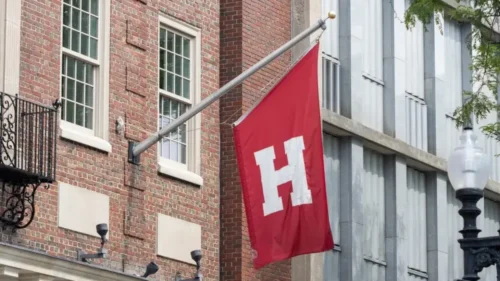“Harvard is a threat to democracy,” declared US President Donald Trump in a Truth Social post. He accused the university of being an “Anti-Semitic, Far Left Institution” and a breeding ground for “crazed lunatics” who “spew fake ANGER AND HATE.” This tirade marks an escalation in what has become a full-scale political assault on American academia. Earlier this month, the Trump administration froze more than $2.2 billion in grants and $60 million in research contracts to Harvard — an unprecedented act of financial retaliation that threatens to reshape the boundaries between state power and intellectual independence. The White House is now leveraging control over federal funding, launching an Internal Revenue Service (IRS) probe into Harvard’s tax-exempt status and threatening to revoke an additional $1 billion in health research support.
What might appear to be a bureaucratic dispute over compliance has become something far more consequential: an attempt to use the financial and regulatory machinery of the state to force ideological conformity in higher education. The stated rationale is straightforward. Harvard allegedly failed to implement federal directives aimed at suppressing pro-Palestinian activism on campus, disbanding certain student groups viewed as hostile to national security, and scaling back diversity-related programming. But beneath the surface lies a broader effort to quell dissent and redefine the mission of higher education to align with a narrow political vision. Harvard may be the first target, but it will not be the last. This is a direct challenge to academic freedom and open inquiry. Already, researchers at Harvard have halted tuberculosis and Alzheimer’s studies because of the funding freeze — proof that this retaliation will harm more than campus politics.
The political message is increasingly clear: academic institutions must align with the ideological priorities of those in power or face serious consequences. In recent months, other institutions — Columbia, Yale, Princeton — have encountered similar pressures. Columbia University has faced scrutiny over its handling of pro-Palestinian activism, with the Department of Homeland Security (DHS) implementing measures to review the social media activity of international students for signs of antisemitism. Columbia has imposed disciplinary actions, including suspensions and expulsions, on students involved in last year’s protests. Federal levers such as research funding, student visa approvals, and tax exemptions are now being used to incentivize compliance. This is not merely about endowments or budget lines. The concern is academic independence — and with it, the future of dissent in public life.
Since 2016, certain media outlets and political figures have reframed universities as bastions of ideological radicalism. Gallup polling shows trust in higher education at historic lows, with 58% of conservatives viewing universities as “actively hostile” to their values — a perception the administration exploits. Academic programs focused on racial justice or climate science are often ridiculed as symbols of liberal overreach. This backlash has helped recast institutions of knowledge production as partisan actors.
Harvard fights back
Resistance is emerging. More than 3,800 Harvard alumni donated in a 24-hour surge following the funding freeze. Faculty filed AAUP v. Department of Education, a lawsuit alleging that the administration violated the First Amendment by punishing political expression. Harvard is not under pressure over a single policy. It is being challenged for what it symbolizes: an institution that resists political interference, advocates for marginalized students, and still defends open inquiry.
Higher education remains one of the few spaces where difficult or unpopular truths — about foreign policy, racial inequality, or structural injustice — can be examined without state interference. That space is under threat. The administration’s funding freeze, and the accompanying signals about tax-exempt status and international student access, send a message to universities: neutrality is not protection, and silence may not save you.
Elite institutions often respond to political pressure by staying quiet or compromising. That approach no longer works. Harvard’s leadership has so far declined to capitulate. University President Alan Garber publicly rejected the federal directives, citing constitutional protections and institutional autonomy. But Harvard cannot fight this alone. A collective response is necessary. Institutions must recognize this as a political test of the legitimacy of independent institutions. If they fail to act together, the consequences will extend beyond any one campus.
The federal government can wield billions in funding with a single directive. Universities are left to respond with public statements, litigation, and donor outreach. That imbalance reveals how fragile institutional autonomy becomes when unchecked political power is directed against it. This moment challenges the longstanding assumption that democratic structures will naturally withstand authoritarian pressures. What we are seeing now is a systematic effort to erode the informal norms that once protected academic independence.
A broad-scale attack on free speech
This offensive aligns with broader political trends: the rollback of diversity, equity, and inclusion (DEI) initiatives, restrictions on gender identity and expression, book bans, surveillance of activist movements, and attacks on media and cultural institutions. These efforts aim to narrow the space for dissenting views. Universities must now choose: accommodate or resist. Accommodation may bring short-term stability but risks long-term irrelevance. Resistance carries risk — but it may be the only way to preserve the essential purpose of higher education.
Democrats have often hesitated to defend elite universities, wary of backlash. But failing to do so now creates a dangerous precedent. If the federal government can cut off funds to Harvard without real political cost, it could next target community colleges, public universities, or independent research centers. Faculty committees, student groups, and alumni networks understand the threat. Petitions and protests are necessary, but so are structural coalitions. The deeper question is whether democratic societies are prepared to defend dissent not just in principle, but in practice — when it is messy, unpopular, and politically costly. The erosion of academic freedom does not happen all at once. It begins with chilled speech, isolated punishments, and administrative compliance. It ends with the quiet death of intellectual autonomy. And when that happens, we will not just lose universities — we will lose something far more foundational: the ability to think freely in a democracy that still pretends to be one.
The views expressed in this article are the author’s own and do not necessarily reflect Fair Observer’s editorial policy.
Support Fair Observer
We rely on your support for our independence, diversity and quality.
For more than 10 years, Fair Observer has been free, fair and independent. No billionaire owns us, no advertisers control us. We are a reader-supported nonprofit. Unlike many other publications, we keep our content free for readers regardless of where they live or whether they can afford to pay. We have no paywalls and no ads.
In the post-truth era of fake news, echo chambers and filter bubbles, we publish a plurality of perspectives from around the world. Anyone can publish with us, but everyone goes through a rigorous editorial process. So, you get fact-checked, well-reasoned content instead of noise.
We publish 3,000+ voices from 90+ countries. We also conduct education and training programs
on subjects ranging from digital media and journalism to writing and critical thinking. This
doesn’t come cheap. Servers, editors, trainers and web developers cost
money.
Please consider supporting us on a regular basis as a recurring donor or a
sustaining member.
Will you support FO’s journalism?
We rely on your support for our independence, diversity and quality.








Comment